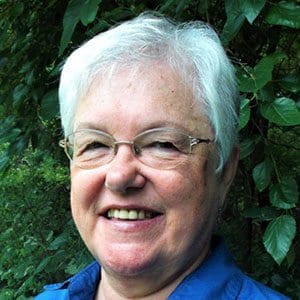Editor’s note: Miriam Frey has been a spiritual director for 20 years and has deep experience in the training of spiritual companions. She is coordinator of Ontario’s Jubliee Program. She’s also worked at SDI as our Canada Coordinator. We asked her to offer key guiding questions for people looking for a formation or training program. We recommend you give this blog post some time and focus. Read it. Discern on the questions that resonate with you. Then read it again. And if you are considering becoming a spiritual companion, please accept our deepest thanks. This calling offers a blend of contemplative practice and deep listening which can change the lives of individuals and through them, their relationships and their communities. As the saying goes…. “How do we change the world most profoundly? One person at a time.” Blessings to you all.
“How do I find a formation or training program?” This is a common question from those interested in serving as a spiritual companion or director. Others will ask, “How do I know if a program is right for me?”
It is important to surround your search with openness to the process and to prayer or meditation or simple stillness. It helps to trust that the inner guidance available to you will be provided, and that you will find a program that is congruent with your values. In this way, it is much like finding a spiritual companion.
Identify Your Values
The first step is to determine what you value both as a spiritual person and as an adult learner. Consider the following questions:
- What core tradition are you looking for? Are you drawn toward Ignatian training (based on the Spiritual Exercises of St Ignatius of Loyola), an ecumenical or interfaith program, a contemplative or mystical tradition, an inter-spiritual or multi-faith program, or a specific tradition within Christianity, Judaism, Buddhism, Hinduism, Islam, etc.?
- What schedule would work for you? There are weekly or monthly classes or university courses that require regular attendance. There are online programs that allow you to work more on your own. There are also week-long residencies held annually at retreat centres.
- What components of learning are important to you? Programs vary in their delivery of content. The emphasis might be: lectures, book learning, experiential practices, creative arts, body movement, or online sessions (either teaching or small group meetings). Since programs vary, it will be important to identify your level of comfort with the internet and electronic communication (Skype, Facetime, Google Hangouts, etc.) that are commonly used in formation and training programs.
- How far and how often are you willing to travel? Unless you are working online or live close to the school or retreat centre, training will require monthly, quarterly or annual (car or air) travel in order to meet with the instructor and/or other students.
When assessing formation and training programs, it is important to know what you want and need. This information will provide helpful anchors as you proceed.
Research
Next you will want to find formation and training programs that fit your values. You might:
- Ask your spiritual companion, or a well-connected spiritual companion, what’s available. Ask questions about, and research further, the programs they recommend.
- Inquire at a retreat centre, university, or seminary if they have a spiritual director on staff who might discuss options with you. Explain what you are seeking (what you value) and ask this person for suggestions, along with their evaluation of the pros and cons of each program.
- Do a Google search for either “spiritual direction training,” or combine that with words like “seminary,” “retreat centre,” a geographical location, or specific tradition e.g. “Jewish spiritual direction training” or “seminary spiritual direction training,”
- Consult the Spiritual Directors International (SDI) Seek and Find Guide, for “formation or training schools.” (Though our listings are growing, this is not yet a comprehensive resource.)
With the information you gather, learn all you can about the programs that interest you.
As was said in the beginning, it is important to pray, meditate or invoke stillness for guidance and to be open to the process since this will allow you to notice life’s nudges. Trust that the people and circumstances that show up will offer you the guidance you need.
Selection
When you are ready to select a formation or training program, learn all you can about two or three programs that fit you as a spiritual person and your learning style. You might:
- Notice how the school or program presents itself on brochures, advertisements or the website. Do you resonate or resist what you read/see? Is the content and description of study appealing to you? Who are the instructors (this may require additional online searches)?
- Contact the formation or training program director or coordinator. These people understand that participating in a training program is a considerable investment of time and resources. They will be open to your inquiries. Ask questions about the tradition, time commitment, style of teaching, class size and program schedule. Find out about program requirements to receive a certificate of completion and expectations around the application process, etc.
- Talk with other people who know the program you are considering. Actively seek out people who have completed the program. (Ask the program coordinator for a referral. It will likely be someone who enjoyed the training, but that person will still be a resource for you. Listen to their experience. Ask questions that naturally arise for you.)
It may be time to step into the unknown when you find harmony within your mind (research and planning), heart (feeling of peace), and body (sensation of alignment). If not, perhaps you and that particular program are not a good fit at this time. In any case, I wish you well in your search. Bon voyage.

Miriam Frey
Miriam Frey is the Coordinator for the Ontario Jubilee program in spiritual direction. She began her career in business and finance. She has expanded her spiritual and cultural awareness through mystical experiences at a young age, a three-year service assignment in east Africa as well as discovering her love of learning. With experience in Jungian dream work and training in the Enneagram, Miriam serves as a spiritual director. Her university degrees include a B.A. in Psychology, M.A. in Religion and Culture and D.Min in spiritual ministry.





1 comentario en “Want to Become a Spiritual Companion? — Read This Before You Apply to a Formation or Training Program”
Pingback: Starting a Spiritual Direction Practice: A Step by Step Guide – Streams of Grace Spiritual Direction